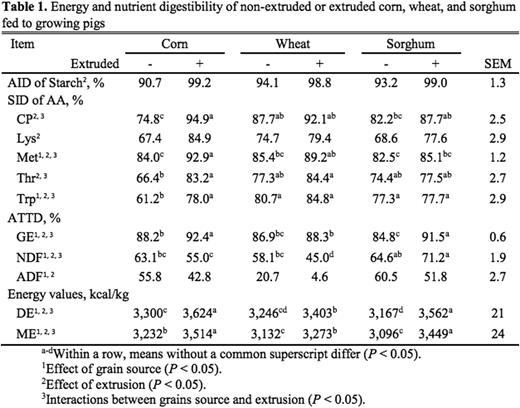-
Views
-
Cite
Cite
Diego A Rodriguez, Su A Lee, Mary B Muckey, Cassandra K Jones, Hans H Stein, 154 Digestibility of amino acids, fiber, and energy, and concentrations of digestible and metabolizable energy in conventional and extruded yellow dent corn, wheat, and sorghum fed to growing pigs, Journal of Animal Science, Volume 97, Issue Supplement_2, July 2019, Pages 85–86, https://doi.org/10.1093/jas/skz122.155
Close - Share Icon Share
Abstract
Two experiments were conducted to determine the effects of extrusion on energy and nutrient digestibility in corn, wheat, and sorghum fed to growing pigs. In Exp. 1, 6 diets based on raw or extruded sources of each grain and an N-free diet were formulated. Seven barrows (14.2 ± 0.9 kg) had a T-cannula installed in the distal ileum and were allotted to a 7 × 7 Latin square. Ileal digesta were collected for 2 d after 5 d of adaptation. Results indicated that extruded grains had greater (P < 0.001) apparent ileal digestibility (AID) of starch than non-extruded grains. Extrusion increased standardized ileal digestibility (SID) of all AA except Pro in corn, but SID of AA in wheat and sorghum was not affected by extrusion (Table 1). In Exp. 2, 48 barrows (15.1 ± 3.7 kg) were allotted to 6 diets based on each of the 6 grains. Pigs were housed individually in metabolism crates and feces and urine were collected quantitatively for 5 d after 5 d of adaptation. The apparent total tract digestibility (ATTD) of GE increased by extrusion of corn or sorghum, but that was not the case for wheat (interaction, P < 0.001). The ATTD of NDF was reduced by extrusion of wheat, but not of corn or sorghum (interaction, P < 0.001). Extrusion reduced (P < 0.05) the ATTD of ADF in all grains. Values for ME were greater in extruded corn and sorghum compared with non-extruded grains, but ME in wheat was not affected by extrusion (interaction, P < 0.001). In conclusion, extrusion of corn, wheat, and sorghum increased AID of starch and SID of all indispensable AA. The ME in corn and sorghum was also increased.






